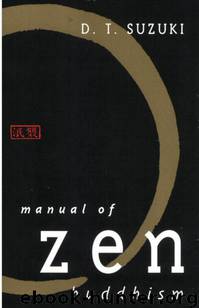The Manual of Zen Buddhism by D.T. Suzuki

Author:D.T. Suzuki [Suzuki, D.T.]
Language: eng
Format: epub
Published: 2012-02-21T14:11:50+00:00
III
FROM HUI-NENG'S TAN-CHING[1]
24. Mahaprajnaparamita is a Sanskrit term of the Western country; in T'ang it means "great-wisdom (chih-hui), other-shore reached". This Truth (dharma=fa) is to be lived, it is not to be [merely] pronounced with the mouth. When it is not lived, it is like a phantom, like an apparition. The Dharmakaya of the Yogin is the same as the Buddha.
What is maha? Maha means "great". The capacity of Mind is wide and great, it is like emptiness of space. To sit with a mind emptied makes one fall into emptiness of indifference. Space contains the sun, the moon, stars, constellations, great earth, mountains, and rivers. All grasses and plants, good men and bad men, bad things and good things, Heaven and hell-they are all in empty space. The emptiness of [Self-] nature as it is in all people is just like this.
25. [Self-] nature contains in it all objects; hence it is great. All objects without exception are of Self-nature. Seeing all human beings and non-human beings as they are,
[1. The Tun-huang copy, edited by D. T. Suzuki, 1934. Hui-neng = Yeno, 637-712.]
evil and good, evil things and good things, it abandons them not, nor is it contaminated with them; it is like the emptiness of space. So it is called great, that is, maha. The confused pronounce it with their mouths, the wise live it with their minds. Again, there are people confused [in mind]; they conceive this to be great when they have their minds emptied of thoughts--which is not right. The capacity of Mind is great; when there is no life accompanying it it is small. Do not merely pronounce it with the mouth. Those who fail to discipline themselves to live this life, are not my disciples.
26. What is prajna? Prajna is chih-hui (wisdom). When every thought of yours is not benighted at all times, when you always live chih-hui (=prajna, wisdom), this is called the life of Prajna. When a single thought of yours is benighted, then Prajna ceases to work. When a single thought of yours is of chih, i.e. enlightened, then Prajna is born. Being always benighted in their minds, people yet declare themselves to be living Prajna. Prajna has no shape, no form, it is no other than the essence (hsing) of chih-hui (wisdom).
What is Paramita? This is a Sanskrit term of the Western country. In Yang it means "the other shore reached". When the meaning (artha in Sanskrit) is understood, one is detached from birth and death. When the objective world (visaya) is clung to, there is the rise of birth and death; it is like the waves rising from the water; this is called "this shore". When you are detached from the objective world, there is no birth and death for you; it is like the water constantly running its course: this is "reaching the other shore". Hence Paramita.
The confused pronounce [Prajna] with their mouths; the wise live it in their minds. When it is merely pronounced, there is at that very moment a falsehood; when there is a .
Download
This site does not store any files on its server. We only index and link to content provided by other sites. Please contact the content providers to delete copyright contents if any and email us, we'll remove relevant links or contents immediately.
The Way of Zen by Alan W. Watts(6601)
Ego Is the Enemy by Ryan Holiday(5417)
The Art of Happiness by The Dalai Lama(4125)
The Book of Joy by Dalai Lama(3976)
Why Buddhism is True by Robert Wright(3447)
Spark Joy by Marie Kondo(3299)
Shift into Freedom by Loch Kelly(3194)
Happiness by Matthieu Ricard(3040)
A Monk's Guide to a Clean House and Mind by Shoukei Matsumoto(2912)
The Lost Art of Good Conversation by Sakyong Mipham(2651)
The Meaning of the Library by unknow(2565)
The Unfettered Mind: Writings from a Zen Master to a Master Swordsman by Takuan Soho(2309)
The Third Eye by T. Lobsang Rampa(2260)
Anthology by T J(2210)
Red Shambhala by Andrei Znamenski(2193)
The Diamond Cutter by Geshe Michael Roach(2058)
Thoughts Without A Thinker: Psychotherapy from a Buddhist Perspective by Epstein Mark(2014)
Twilight of Idols and Anti-Christ by Friedrich Nietzsche(1892)
Advice Not Given by Mark Epstein(1878)
